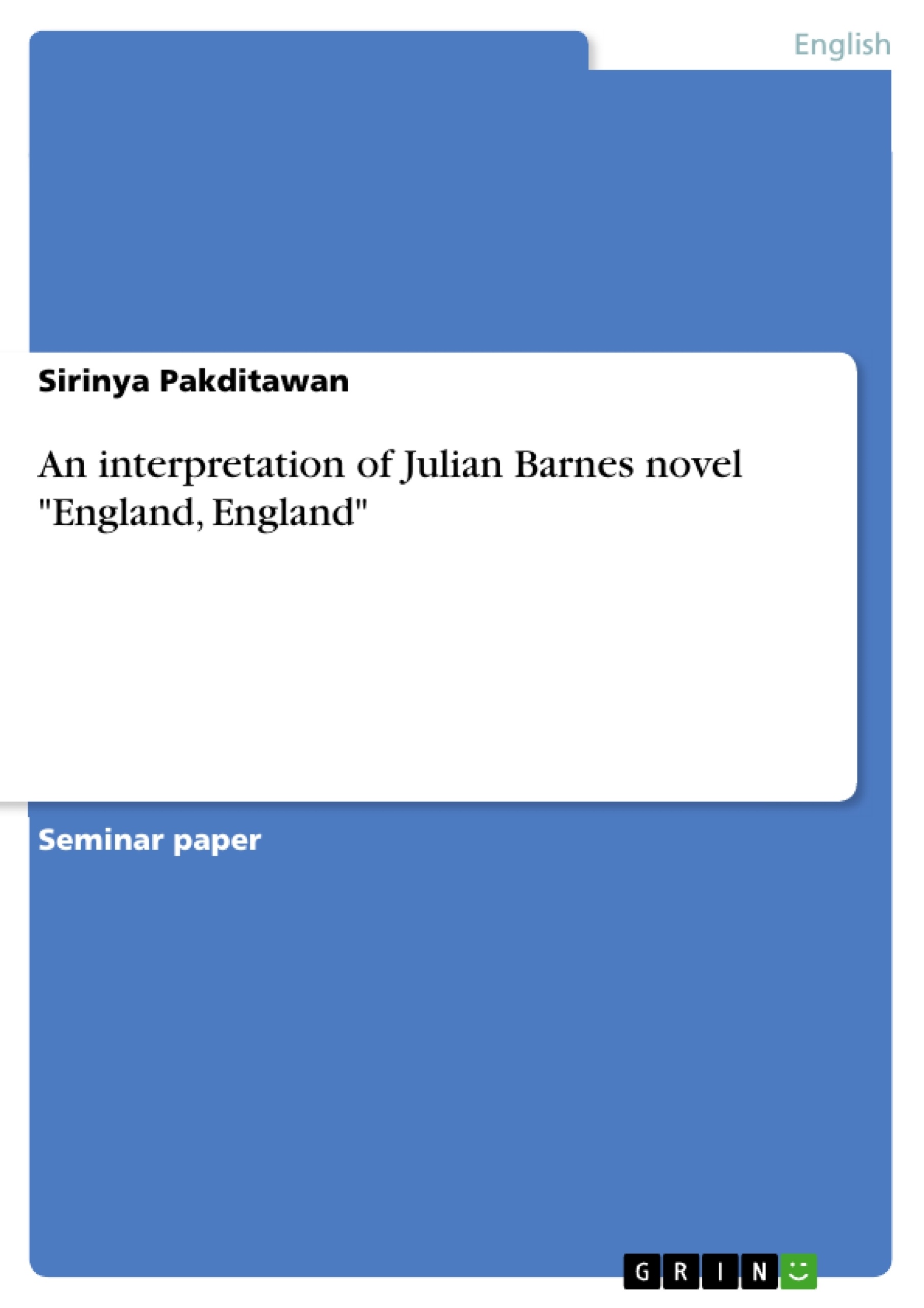Numerous contemporary British novels display an almost obsessive concern with the notion of Englishness. Hence, they focus on the myths, traditions and attitudes that are regarded as typically English.
With its interest in Englishness, the nature of historical truth, and the blurring of boundaries between the authentic and the imitation, Julian Barnes’ novel "England, England" (1998), which was short-listed for the Booker prize in 1998, shares important concerns with many contemporary British novels. Hence, this novel shows all the features characteristic of postmodernist historiographic metafiction. That is to say, like other historiographic metafictions, "England, England" is “both intensely self-reflexive and yet paradoxically also lay[s] claim to historical events and personages”. What is more, Barnes’ novel also reflects the feature which has been the major focus of attention in most of the critical work on postmodernism, i.e. a self-conscious assessment of the status and function of narrative in literature, history, and theory: “its theoretical self-awareness of history and fiction as human constructs (historiographic metafiction) is made the grounds for its rethinking and reworking of the forms and contents of the past”.
One might be justified in saying that Barnes’ novel explores, constructs, parodies, and deconstructs the ‘invented traditions’ known as ‘Englishness’. The novel incorporates a great number of different traces of the English cultural past, including many myths and legends, juxtaposes competing versions of and discourses about Englishness. Additionally, it also explores the complexity of any account of a nation’s organically grown cultural memory and identity. Therefore, Barnes’ novel does not only express a wide range of versions of Englishness, but also offers self-conscious reflections upon both the invention of cultural traditions and the questionable notion of historical authenticity.
Hence, in the following analysis, it will be examined how "England, England" thematizes and explores the invention of cultural traditions, by constructing and deconstructing ‘Englishness’. Thus, it will be primarily focussed on Barnes’ fictional exploration of those invented traditions known as ‘Englishness’ and shown how the content and the form of this novel self-consciously examine and deconstruct the notion of authenticity.
Inhaltsverzeichnis (Table of Contents)
- Introduction
- The (De-)Construction of Englishness and the Invention of National History in Julian Barnes' England, England
- Conclusion
- Bibliography
Zielsetzung und Themenschwerpunkte (Objectives and Key Themes)
This analysis examines the construction and deconstruction of Englishness within the context of Julian Barnes' novel "England, England". The focus is on how the novel utilizes the invention of cultural traditions to explore themes of national identity, historical truth, and the blurring of boundaries between authenticity and imitation.
- The complex interplay of memory, history, and national identity
- The invention and manipulation of cultural traditions to shape a national narrative
- The blurring of boundaries between the authentic and the imitated in constructing national identity
- The role of history as a discursive construct and its influence on national identity
- The satirical exploration of Englishness and its various representations
Zusammenfassung der Kapitel (Chapter Summaries)
The analysis begins by exploring the protagonist Martha Cochrane's early childhood memories, highlighting the connection between individual and national memory, and the introduction of patriotism as a key theme. The analysis then examines the novel's satirical portrayal of history as taught in Martha's school, emphasizing the glorification of national history and the perpetuation of idealized narratives.
The analysis will then move on to explore the second stage of Englishness presented in Part II of the novel. This section focuses on the efforts of Sir Jack Pitman and his steering committee to capitalize on England's perceived cultural value, examining the commodification of national identity and the construction of a manufactured "England" for tourist consumption.
Schlüsselwörter (Keywords)
Key terms and concepts explored in this analysis include Englishness, national identity, cultural memory, historical authenticity, invented traditions, postmodernism, historiographic metafiction, and satirical representation.
Frequently Asked Questions
What is the central theme of Julian Barnes' novel "England, England"?
The novel explores the construction and deconstruction of "Englishness," focusing on national identity, myths, traditions, and the blurring of boundaries between the authentic and the imitation.
Why is the novel considered "historiographic metafiction"?
It is self-reflexive and rethink historical events and personages, treating history and fiction as human constructs rather than absolute truths.
What role does Martha Cochrane play in the analysis?
The analysis examines Martha's childhood memories to highlight the connection between individual memory, national memory, and the introduction of patriotism.
What is the focus of Part II of the novel?
Part II focuses on Sir Jack Pitman's project to commodify national identity by creating a manufactured "England" for tourist consumption.
Which literary period does this novel represent?
The novel is a characteristic work of postmodernism, utilizing satire and parody to examine cultural traditions.
- Citation du texte
- Sirinya Pakditawan (Auteur), 2004, An interpretation of Julian Barnes novel "England, England", Munich, GRIN Verlag, https://www.grin.com/document/59351



